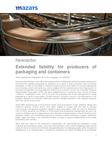
Extended liability for producers of packaging and containers
Colombia has not been a stranger to the global clamor to adopt public policies aimed at reducing the environmental liabilities generated by industries as a result of their production and commercial processes. In order for the State to implement legal provisions that allow it to exercise appropriate environmental control and monitoring, and to comply with the requirements of the Organization for Economic Cooperation and Development (OECD) as a member country, the Extended Producer Responsibility (hereinafter "EPR") has been established as a mechanism that involves all those involved in a production chain. This is to unite and guarantee the correct management of waste produced as a result of consumption, through recovery, recycling, use and, if this last criterion is not possible, adequate final disposal, seeking to achieve a tangible reduction of the negative footprints left in the natural environment.
Since 2009, several groups of the economic sector, such as producers of tires, batteries, electric and electronic devices, among others, have been subject to comply with the duty to develop environmental management programs related to post-consumption. Now, by virtue of Resolution 1407 of 2018, issued by the Ministry of Environment and Sustainable Development, the time has come for all those natural or legal persons who, according to the provisions of the third article of the regulation ibidem, are considered producers of containers and/or packaging of paper, cardboard, plastic, glass and metal in the Colombian territory, to begin to assume responsibility for the waste produced by their articles.
What does this imply for the producers? Undoubtedly, the aforementioned constitutes a great challenge for this business sector, every time that Resolution 1407 of 2018 establishes that it will be a duty for them to submit environmental management plans for packaging waste, either through the development of an individual plan or linking to a collective one, before the National Environmental Licensing Authority (hereinafter "ANLA"), taking into account the following deadlines: existing producers as of December 31, 2017, must file their plans no later than December 31, 2020; existing producers as of January 01, 2018, must file their plans on December 31 of the year following the first fiscal period of operation, counted from January 01 to December 31.
The content of the plan to be submitted must be in accordance with the guidelines provided in the sixth article of the aforementioned resolution, but it is worth noting that it must be designed with the objective of meeting the utilization goals determined in the ninth article, which provide that by 2021 producers have the duty to certify that 10% of the total weight of the packaging and/or containers placed on the market have been reused. It should be noted that if the producer is part of a collective plan, the calculation methodology to be applied varies.
By 2030 the percentage to be guaranteed will be 30%, which is why, taking into account the ambition of the goals proposed by the Ministry year after year, producers must implement effective strategies that allow them to achieve these values. However, Resolution 1407 of 2018 did not leave the monitoring issue adrift, since producers are also required to submit annual reports to the ANLA, in which their progress against the specific issue is evidenced.
It is important to emphasize that compliance with the obligations established in Resolution 1407 of 2018 is not optional and failure to comply could result in the imposition of measures and sanctions contained in Law 1333 of 2009; this is why producers should not expect to be close to the expiration of the deadline, since the development and adoption of the environmental management plans required by the authority entail investments, research work, rethinking production models and restructuring administrative areas.
Finally, and giving visibility to the countless problems faced by the environment, the resolution in question should not be taken as just another obligation to be complied with to avoid fines or measures that affect particular interests, but on the contrary, it should also be interpreted as an opportunity to generate great changes through the development and elaboration of eco-sustainable designs that, in turn, maximize the useful life of each of the elements that make it up, thus generating an added value in the products, which will translate into commercial benefits and consumer loyalty.


